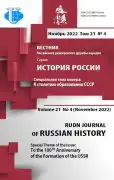U.S. and ‘Turkestan’ Political Exiles during the Cold War: Information Policy of Radio Liberty in Soviet Central Asia
- Autores: Antoshin A.V.1
-
Afiliações:
- Ural Federal University
- Edição: Volume 21, Nº 4 (2022): To the 100th Anniversary of the Formation of the USSR
- Páginas: 509-525
- Seção: TO THE 100TH ANNIVERSARY OF THE FORMATION OF THE USSR
- URL: https://journal-vniispk.ru/2312-8674/article/view/321971
- DOI: https://doi.org/10.22363/2312-8674-2022-21-4-509-525
- ID: 321971
Citar
Texto integral
Resumo
US policy in Central Asia is a topical issue that causes discussions among researchers. One can't help wondering about the origins of this policy, particularly during the Cold War era. This, in turn, leads scholars to question the U.S.'s role in the disintegration of the Soviet Union and the formation of independent states in the former territory of Soviet Central Asia. This article discusses the effectiveness of American propaganda services operating in Central Asia during the Cold War. The most prominent structure which tried to influence political sentiments of population of this region was Radio Liberty (RL). It consisted of former Nazi collaborators during World War II, and Soviet propaganda apparatus used this situation. RL used the concept of a united anti-communist Turkestan which was unacceptable for real situations in Soviet Central Asia. Jamming and the lack of feedback from listeners made great obstacles for activity of RL in this region. That is why the author attempts to prove that the effective-ness of this activity was not so great as its financial support. Using archives of Russian and American security services and documents of Central Asian archives, future scholars will have the possibility to clarify this conclusion.
Palavras-chave
Sobre autores
Alexey Antoshin
Ural Federal University
Autor responsável pela correspondência
Email: alex_antoshin@mail.ru
ORCID ID: 0000-0002-6093-2219
Dr. Habil. Hist., Professor of the Oriental Studies Department
19, Prospekt Mira Av., Yekaterinburg, 620083, RussiaBibliografia
- Amirov, Taukel. Krah legiona. Alma-Ata: Kazahstan Publ., 1970 (in Russian).
- Anderson, John. Religion, State and Politics in the Soviet Union and Successor States. Cambridge: Cambridge University Press, 1994.
- Bennigsen, A. ed. Soviet Strategy and Islam. New York: St. Martin's Press, 1989.
- Cull, Nicholas. The Cold War and the United States Information Agency: American Propaganda and Public Diplomacy, 1945-1989. Cambridge: Cambridge University Press, 2009.
- Daniels, Robert. Russia: The Roots of Confrontation. Cambridge; London: Harvard University Press, 1985.
- Goldman Philipp, Lapidus Gail and Zaslavsky, Victor. “Soviet Federalism - its Origins, Evolution and Demise.” In From Union to Commonwealth. Nationalism and Separatism in the Soviet Republic. Cambridge: Cambridge University Press, 1993.
- Guerrero, Javier Gil. “Propaganda Broadcasts and Cold War Politics: The Carter Administration’s Outreach to Islam.” Journal of Cold War Studies 19, no. 1 (2017): 4-37. https://doi.org/10.1162/JCWS_a_00716
- Kalinovsky, Artemy, “Encouraging Resistance: Paul Henze, the Bennigsen School and the Crisis of Détente.” In Kemper, Michael, and Kalinovsky, Artemy, eds. Reassessing Orientalism: Interlocking Orientologies during the Cold War, 211-232. Routledge Studies in the History of Russia and Eastern Europe, 2015
- Kemper, Michael, Motika, Raoul, and Reichmuth, Stefan, eds. Islamic Education in the Soviet Union and Its Successor States. London; New York: Routledge, 2010.
- Khalid, Adeeb. Islam after Communism: Religion and Politics in Central Asia. Berkeley; Los Angeles; London: Univ. of California Press, 2007.
- Kind-Kovacs, Friederike. “Voices, Letters and Literature through the Iron Curtain: exiles and the (trans)mission of radio in the Cold War.” Cold War History, 13, no. 2 (2013): 193-219. https://doi.org/10.1080/14682745.2012.746666
- Martin, John L. International Propaganda: Its Legal and Diplomatic Control. Minneapolis: University of Minnesota Press, 1958.
- Mikkonen, Simo. “Exploiting the Exiles: Soviet Emigres in U.S. Cold War Strategy.” Journal of Cold War Studies 14, no. 2 (2012): 98-127.
- Muminov, Ashirbek. “Fundamentalist Challenges to Local Islamic Tradition in Soviet and Post-Soviet Central Asia.” In Uyama Tomohiko, ed. Empire, Islam and Politics in Central Eurasia, 249-262. Sapporo: Slavic research center, Hokkaido University, 2007
- Neizvestny, Ernest. Govorit Neizvestny. Perm: Permskie Novosti Publ., 1991.
- Olcott, Marta Brill. “Central Asia: The Reformers Challenge a Traditional Society.” The Nationalities Factor in Soviet Politics and Society. Boulder; Oxford: Westview Press, 1990.
- Olcott, Marta Brill. “Soviet Central Asia: Ethnic Dilemmas and Strategies.” In Malik, H. et al., eds. Domestic Determinants of Soviet Foreign Policy towards South Asia and the Middle East. London: Palgrave Macmillan, 1990.
- Risso, Linda. “Radio Wars: Broadcasting in the Cold War.” Cold War History 13, no. 2 (2013): 145-152.
- Ro’i, Yaacov. Islam in the Soviet Union: From the Second World War to Gorbachev. New York: Columbia University Press, 2000.
- Sadykova, Bakhyt. Turkestansky legion, http://www.continent.kz/library / turkestan_legion.html.
- Schlyter, Birgit N., ed. Prospects for Democracy in Central Asia. Istanbul: Swedish Research Institute in Istanbul, 2005.
- Shakibaev, Serik. Padenie ‘Bolshogo Turkestana’. Alma-Ata: Jazushi Publ., 1972.
- Snyder, Alan. Warriors of Disinformation: American Propaganda, Soviet Lies and The Winning of the Cold War. New York: Arcade, 1995.
- Suny, Ronald. “State, Civil Society and Ethnic Cultural Consolidation in the USSR - Roots of the National Question.” In From Union to Commonwealth. Nationalism and Separatism in the Soviet Republics. Cambridge: Cambridge University Press, 1993
Arquivos suplementares









